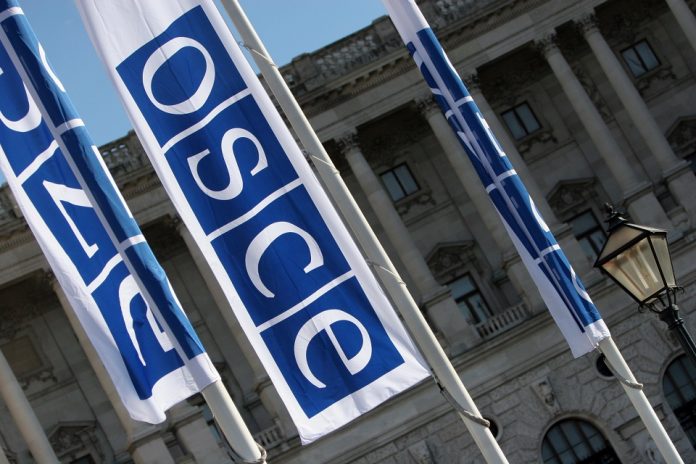Thank you Madame Chair for dedicating today’s Security Dialogue to the important topic of UNSCR 1325 on Women, Peace and Security. Doing so reinforces the importance of gender equality in the achievement of sustainable peace and security. Thanks also to the speakers for their thought-provoking presentations.
Our discussion today follows hot on the heels of last Monday’s excellent event, co-organised by Slovakia, Albania, and Sweden, with the OSCE and UN Women on Reviewing Commitments to the Women, Peace & Security Agenda in the OSCE Region. This highlighted the first-hand experience of panellists, as well as making tangible suggestions for advancing the WPS agenda.
Today’s discussion precedes this afternoon’s event entitled “OSCE enhancing UNSC Resolution 1325: gender equality for a more peaceful world”, co-organised by Finland, Albania and Sweden, and the important UN Security Council Open Debate on Women, Peace and Security on 29 October.
We last had the opportunity to discuss the WPS agenda at the Joint FSC/PC in May. Then, as now, we continue to grapple with the unprecedented crisis brought about by COVID-19. The multiple impacts of the pandemic and the inequalities it lays bare are a stark reminder of the important leading role women play, as actors and decision-makers at all levels in health care, education, political processes and peace processes throughout the OSCE. In addition we have expressed, and express again, concerns around higher rates of domestic violence during COVID-19.
The UK supports a ‘Protection Framework for Women Peacebuilders’, which aims to address a number of the threats women peacebuilders face. We encourage states to endorse this Framework. And we will provide further details of this at tomorrow’s Permanent Council.
Over the past two decades – since the adoption of UNSCR 1325 in October 2000 – a lot has been done to promote the importance of the Resolution and to implement its agenda. We continue to highlight the fact that, 20 years on – less than two-thirds of OSCE participating States have a National Action Plan. We again encourage all participating States yet to adopt a Plan to do so as soon as possible.
Madame Chair, every week in this forum we hear about the outstanding work being done by the SMM in eastern Ukraine, including by women monitors. We are grateful to the SMM for releasing the “Women on the Contact Line” book, which demonstrates how women community leaders, and women SMM monitors, are working towards an inclusive resolution of the conflict.
Unfortunately, as in so many areas, women are under-represented in the SMM. Women still only account for 20% of monitors, and the number of women is also low in senior and field management positions. As we have said previously – we all need to do better.
Women’s participation is key to the success and longevity of peace processes. This is important not only in Ukraine, but all parts of the OSCE region affected by conflict. As an organisation, women should be meaningfully represented among OSCE mediators at all levels in the relevant formats related to the protracted conflicts.
Every one of us can make a difference. This includes through gender-balanced speaker panels and gender-sensitive recruitment processes. We must urge our capitals to put forward women candidates, especially for field missions and the autonomous institutions. We must scrutinise the language that we use. And we must ensure that the decisions we take reflect the needs and experiences of all of society.
As Chair of the Security Committee, I set out to achieve a gender balance on all panels and I’m pleased to say that to date 48% of all panel speakers this year have been women. Examining gender dynamics is an integral part of understanding the impact of transnational threats and how we should respond.
As we have previously said, it is well documented, for example, that terrorist and violent extremist groups understand these dynamics and target their propaganda messages specifically to men and women, manipulating gender norms and stereotypes for recruitment and radicalisation.
And as Chair of the OSCE MenEngage Network, I am determined to continue to progress work to raise awareness of the influence all of us can have in speaking out against inequality and ending gender based violence. The network will continue to work with others in ensuring: gender parity at all job levels in the OSCE; robust action against gender discrimination; a zero tolerance policy on sexual harassment and sexual exploitation and abuse; and women’s full, equal and meaningful participation in all areas of conflict prevention, resolution, and mediation.
Madame Chair, we are delighted that you and your able team will be working with the Albanian Chair-in-Office to bring forward a text for the Ministerial Council in December on UNSCR 1325. We note that MC Decision No. 3/11 reaffirms the ‘significant role of women in the prevention and resolution of conflicts and in peace – building.’
We look forward to working with all participating States to ensure we can use the Ministerial Council both to commemorate the Resolution’s 20th Anniversary, and to add real impetus to its further and better implementation. This includes through ensuring the equal and meaningful participation of women in peace and security, and by supporting women peacebuilding at the grass roots level.
UNSCR 1325 affects every one of us. We should recognise the benefits that greater gender equality will bring to us all. However, we are not going to achieve this overnight. We will need courage, political will, and above all sustained commitment.







